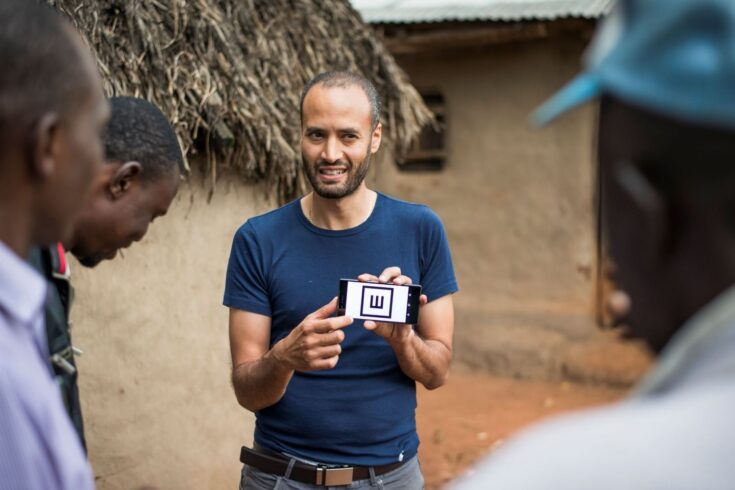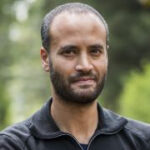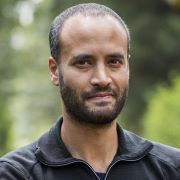30 years ago, I was failing at school. My teachers thought I was lazy, clumsy and wouldn’t amount to much.
Then one day, everything changed. I was taken for an eye test and found to have poor vision that was correctable with glasses.
Seeing the world in focus
When I first tried them on a whole new world came in to focus. I saw trees on leaves and stars in the night sky. It took my breath away.
All I needed was a simple pair of glasses: a 700-year-old invention that today around 800 million people who do not see clearly need and cannot access.
This is not right.
From sight came opportunity
With clear vision, opportunities opened up in front of me. I became a doctor, eye surgeon, professor and founder of Peek Vision. None of which would have happened had I not been afforded the opportunity to see.
11 years ago, the Medical Research Council (MRC) funded my PhD which was when I left my job as an NHS eye surgeon and moved with my wife and one year old son to Kenya.
At the time we were preparing to move to Kenya MRC invited me to participate in a science writing competition. The challenge, in 800 words, to articulate “Why my research matters?”
Articulating a vision
For me, taking a moment to pause and articulate ‘why’ was vital. The act of stopping and writing forces us to be clear on the purpose of what we are doing and to make it accessible to wider audiences.
In my essay I explained my plan to set up 100 eye clinics, train a team of 15 researchers and clinicians and take over £100,000 of equipment to remote and rural locations. This was part of a large study to understand the eye health needs of people in Kenya.
I also wrote about a small side project, which at the time I called ‘the Eye-Phone’. The idea was to replace the need for incredibly scarce specialist staff and expensive equipment with a new way to find people with an eye health need. If we could find these people, in schools and the community, we could determine the problem they have and what would be needed next to treat them.
Household eye checks via smartphone
A year on, having partially adapted to life in Kenya, the clinics were running. As was testing of the prototype smartphone-based tests alongside the clinics, which served as the perfect control arm and was gaining momentum.
A team would go house to house the day before the clinic. They would use the smartphone vision test app we’d built and would then refer them to the clinic the next day if they needed further care.
At one such household, they found a lady. Mama Philip was in her 80s, very frail and had been blind from cataracts for close to 20 years. Her son, Philip, lived next door in a traditional cob house and took care of all her needs.
We were able to persuade her that she should come with us to the hospital for surgery and we would return her to Philip in 2 days. When we reached the hospital, she became agitated and the team were concerned she may have dementia. And that trying to restrain her could result in her thin arms being broken. Eventually her surgery was completed; it was quick and uneventful.
A life transformed
In the morning, the scene was very different. Her eye patch was off. She was sitting on a chair, talking calmly to an old neighbour she hadn’t seen in years. Later that day, we took her home.
The moment we dropped her home is one I will never forget. She stood and stared at her small mud and straw house, unchanged in the 20 years she had been blind. Next to it, a man staring back at her, a mix of concern and anticipation on his face. After what seemed an age, she looked straight at him.
“Philip?” she asked. Tears filled her eyes. Mama Philip embraced her son.
Bringing a written vision to life
In my essay I closed with the line: “the examiner can go to the patient rather than the patient waiting for someone to never come. It could be that those in remote and resource-poor places, silently losing their sight, could be a text message away from help.”
10 years on from having had the honour of winning the MRC Max Perutz Science Writing Award, the ’EyePhone’ is now ‘Peek Vision’. We have a brilliant and dedicated team and together we have designed processes and built technology solutions that mean screening can be done on a smartphone.
Patients and carers receive automated, personalised text messages to inform them of what to do and where to go next. And the eye care providers can track progress in real time using data and to make sure everybody found receives the treatment they need.
Reversing blindness worldwide
Today, 31 programmes are active across 11 countries and in September alone, 177,000 people were reached.
Thanks to the incredible Peek team and our partners worldwide, we are starting to make a dent on the hidden mountain of vision loss. So now people in remote and resource-poor places, silently losing their sight, are receiving text messages and the help they need.
Find out more
Andrew was a guest speaker at our 2022 MRC Max Perutz Science Writing Award ceremony celebrating science communication and 25 years of impact.
Watch our 25 years of impact video.
Read the 2022 award-winning article by Emily Cornish, published by The Observer.




